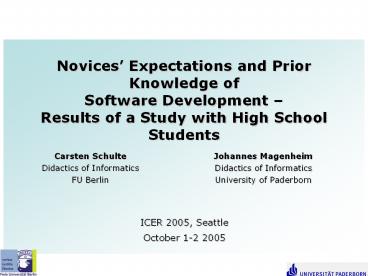Novices - PowerPoint PPT Presentation
Title:
Novices
Description:
Novices' Expectations and Prior Knowledge of. Software Development ... Constructivism: Prior knowledge. affects learning and understanding ... – PowerPoint PPT presentation
Number of Views:47
Avg rating:3.0/5.0
Title: Novices
1
Novices Expectations and Prior Knowledge
ofSoftware Development Results of a Study with
High School Students
- Carsten Schulte Johannes Magenheim
- Didactics of Informatics Didactics of
Informatics - FU Berlin University of Paderborn
- ICER 2005, Seattle
- October 1-2 2005
2
OUTLINE
- Objectives and Hypotheses
- Design
- Results
- Conclusions
3
OBJECTIVES / INTERESTS
Constructivism Prior knowledge affects learning
and understanding
- Differences in interests and expectations?
- Interaction between learners prior Knowledge
- Preconceptions of software development
4
DESIGN OF THE STUDY
- Instruments
- Questionnaires Interests, Expectations (from
Pilot-Study) - Preconceptions of Software development (open
question) - INCOBI / FIM, CIM (from psychological tests)
- Conducting
- Mailing-list biased group
- Beginning of grade 11 22 schools, 28 classes,
573 students - Methods
- Factor Analysis
- Regression Analysis
- Qualitative content analysis
5
HYPOTHESES
- Hypotheses
- H1 Groups with different interests
- H2 Different expectations regarding subject
matters - H3 Different preconceptions of software
development - H4 Interests and expectations are
gender-specific - H5 Mutual influences of interests, expectations
and preconceptions - H6 Influence of computer literacy courses
attended at junior high school level
6
GENDER DIFFERENCES Interests and Expectations
7
GENDER DEIFFERENCESPrevious Knowledge,
Job-Oriented Motivation
- Job-oriented Motivation
- Im interested in a job related to computer
science - Im interested in a job which includes computer
usage - Knowledge related to Computer usage (4.8 girls,
6.3 boys) - Motivation to use a computer (CIM 2.7 girls 3.0
boys) - Self-Confidence in computer usage (SUCA 2.40
girls 2.95 boys)
8
GROUPS WITH DIFFERENT INTERESTS
H1
- Type 1 experienced with interests in
informatics 18 (25 m, 5 w) - Type 2 novices with interests in usage and
applications 18 (16 m, 23 w) - Type 3 job-oriented interests 18 (23 m, 11
w) - Type 4 unable to specify particular motive /
no specific motives 12 (8 m 19 w) - Type 5 informatics just to fill a gap 6
- Type 6 computer users with few interests related
to informatics 1
9
DIFFERENT EXPECTATIONS REGARDING SUBJECT MATTERS
H2
- Type 1 Programming Languages and Software
development 16 (20 m 8 w) - Type 2 Introductory Course, Usage of Computers,
Dealing with Social Impacts 17 (12 m 26 w) - Type 3 Co-operative work indiverse, partly
indistinct application 16 (13 m 22
w) - Type 4 Computer-centred work with few discussions
in the group 15 (15 m 16 w)
10
MODEL / CODING SCHEME OF SOFTWARE (DEVELOPMENT)
technical
social
product
customer
process
evolution
- Team
- Coding
- Planing
- Test
- Steps
- Iteration
- Abstraction
- Formal
- Parts
- (G)UI
- Datastructure
- Algorithm
- Gather Needs
- Analyse Needs
- Cost Estimation
- Task Analysis
- Cooperation
- Reengineering
- Versions
- Antizipate HCI / Workflow
11
DIFFERENT PRECONCEPTIONS OF SOFTWARE DEVELOPMENT
technical
social
H3
product
customer
process
evolution
- Team
- Coding
- Planing
- Test
- Steps
- Iteration
- Abstraction
- Formal
- Parts
- (G)UI
- Datastructure
- Algorithm
- Gather Needs
- Analyse Needs
- Cost Estimation
- Task Analysis
- Cooperation
- Reengineering
- Versions
- Antizipate HCI / Workflow
Blue lt 5 of answers Normal 10 Italic
22 Bold gt 40
12
INTERESTS AND EXPECTATIONS ARE GENDER SPECIFIC
- programming and software-development
- experienced with computers
- Higher self-confidence in computer usage
- Computer usage
- Questions of social impact
- computer skills are generally important without
being able to go into details
Preconceptions of software development Difference
s in process-scale in Teamwork, Testing and
Steps, girls have significantly lower values
H4
13
MUTUAL INFLUENCES BETWEEN INTERESTS, EXPECTATIONS
AND PRECONCEPTIONS
H5
- Experienced with interests in informatics
- Expecting Programming Languages and Software
development - Better computer knowledge (significant
correlation with FIM) - Regarding process-aspects of software development
- Positive correlation to software-development
process-scale (0.28) - Novices with interests in usage and
applications. - Expecting Introduction-, Usage- and
Impact-Courses. - Lesser computer knowledge
- Disregarding process-aspects of software
development - Negative correlation to software-development
process-scale (-0.22) - But open for other aspects????
14
INFLUENCE OF COMPUTER LITERACY COURSES ATTENDED
AT JUNIOR HIGH SCHOOL LEVEL
15
CORRELATIONS WITH PROCESS SCALE
H6
Whole group
With previous computer literacy course at lower
secondary level
16
CONCLUSIONS I TEACHING METHODS
- Process-aspects of software development
- Similarities to teaching writing
- Novices are given a topic to write about
- immediately produce text by writing their first
idea, then their next idea, - in contrast, experts also planning and revising
- naive beliefs about the nature of expert writing
thinking that writing is a smooth and easy
process for "good" writers.-gt disencouriging - Possible teaching strategy
- providing students with a model of (writing)
programmingthat involves planning and revising - teaching control strategies
17
CONCLUSIONS SUBJECT MATTER
- Programming Languages, Software Development
- Usage and Applications and social impacts
- Product as well as Process aspects of Software
Development - methods beginners courses differentiated by
subject matters? - Teaching programming affects understanding of
process aspects - developer-user interaction and evolutionary
aspects should be integrated socio-technical
view. - there is prior knowledge, teaching concepts can
rely on - include multiple perspectives (customer etc.)
- Include socio-technical characteristics of the
product software

